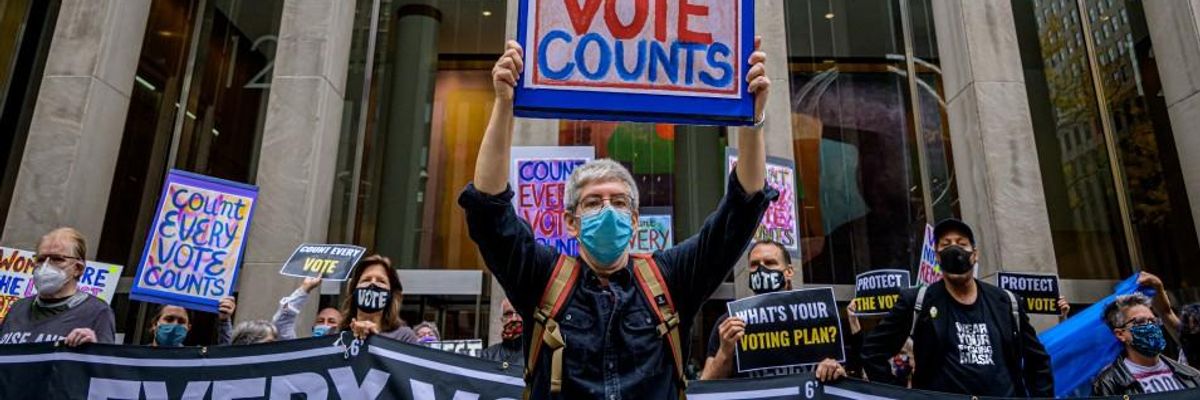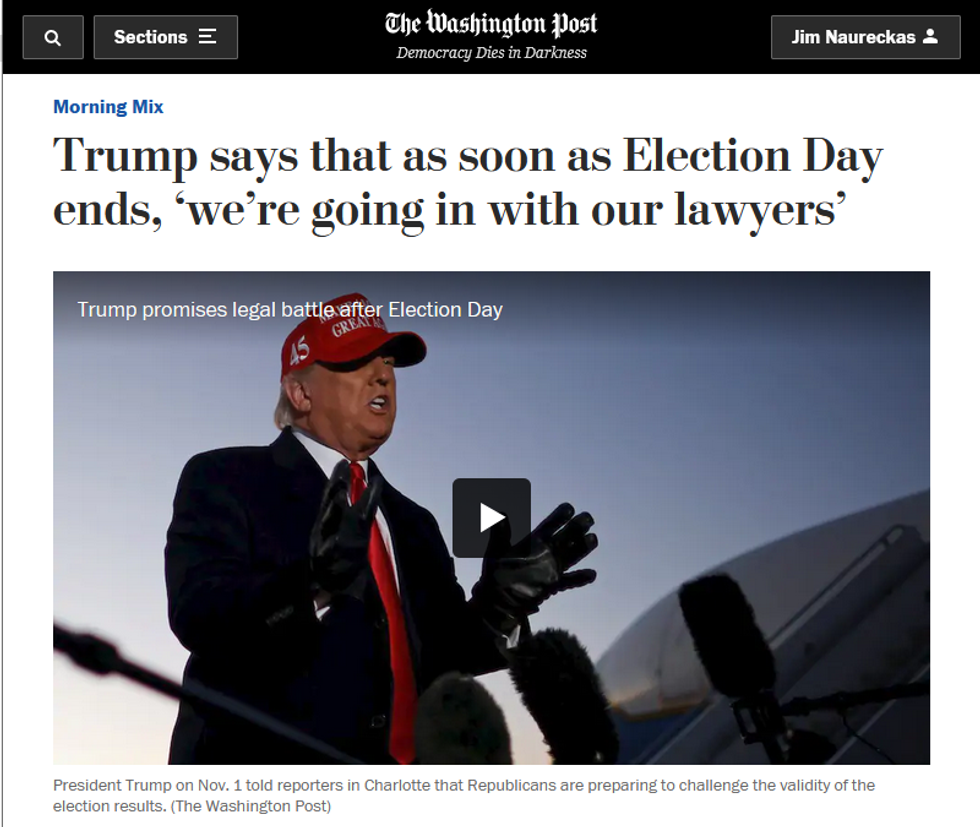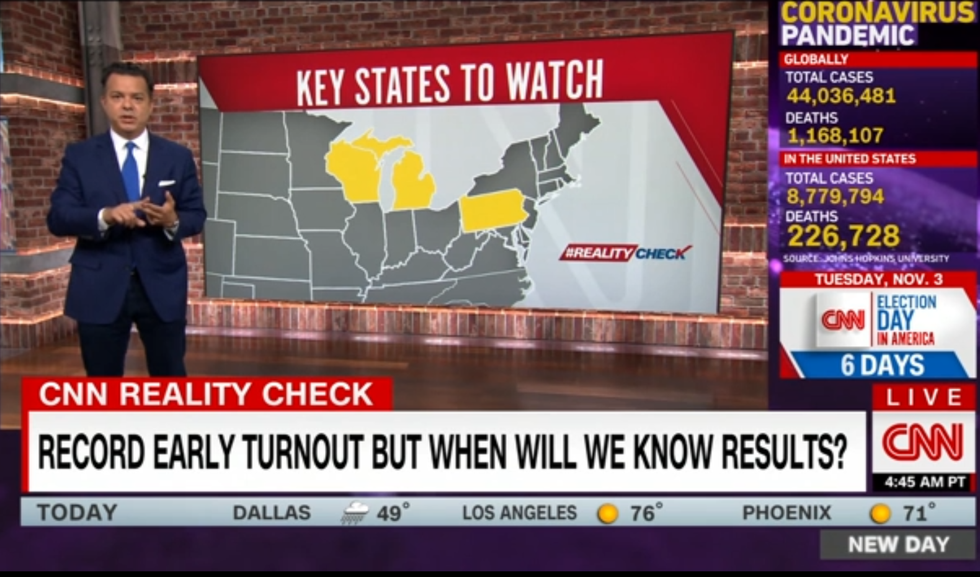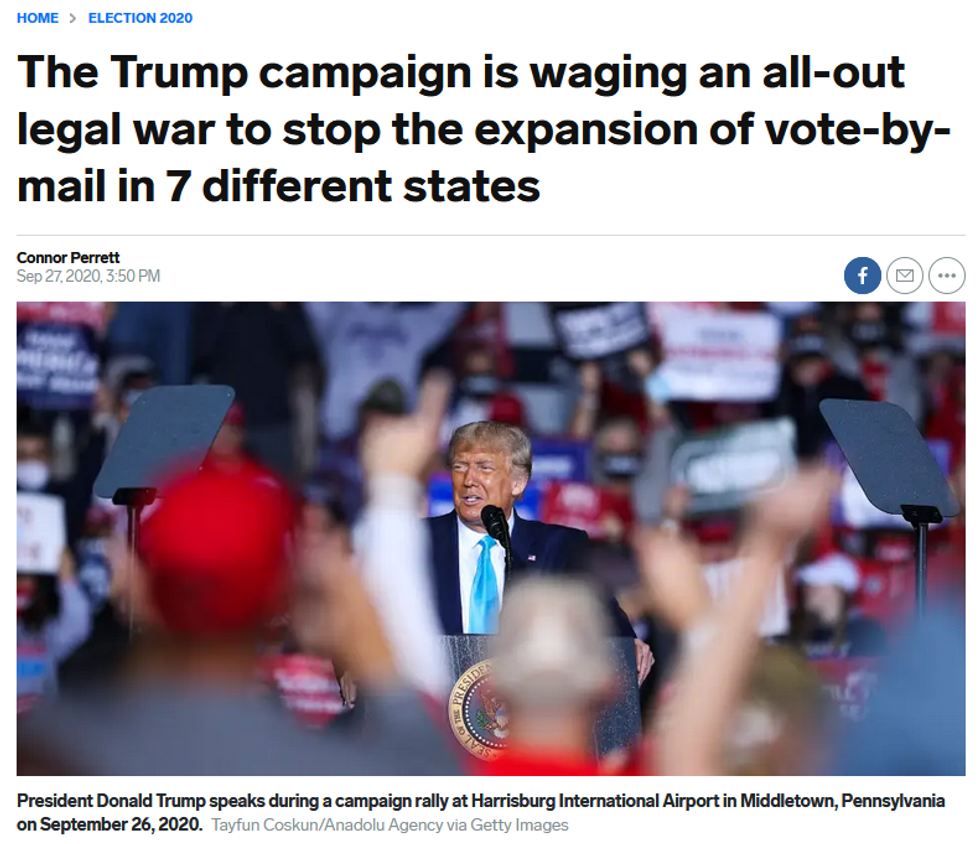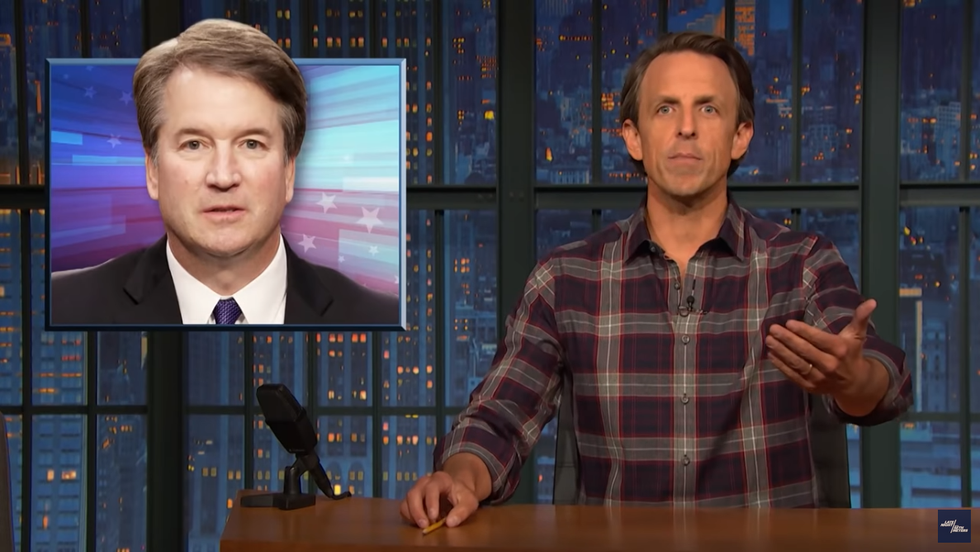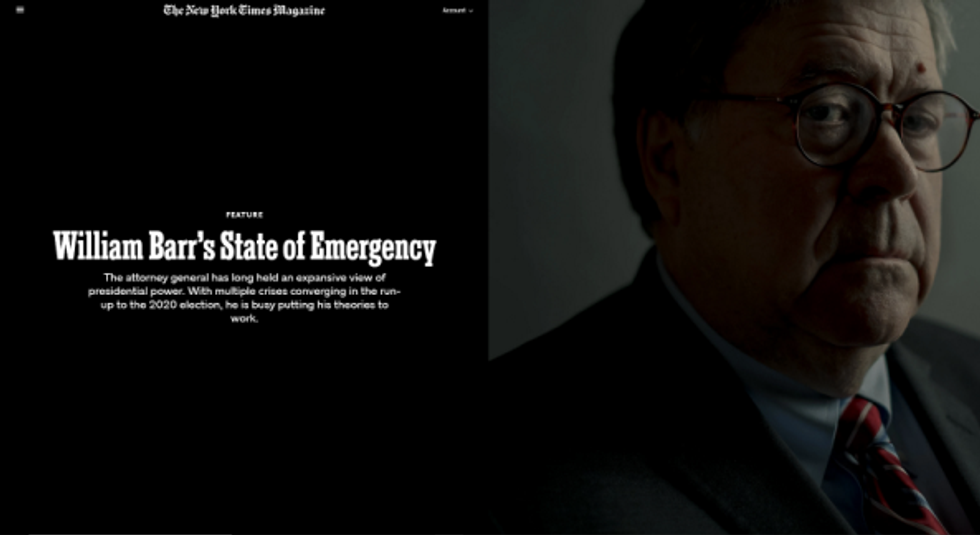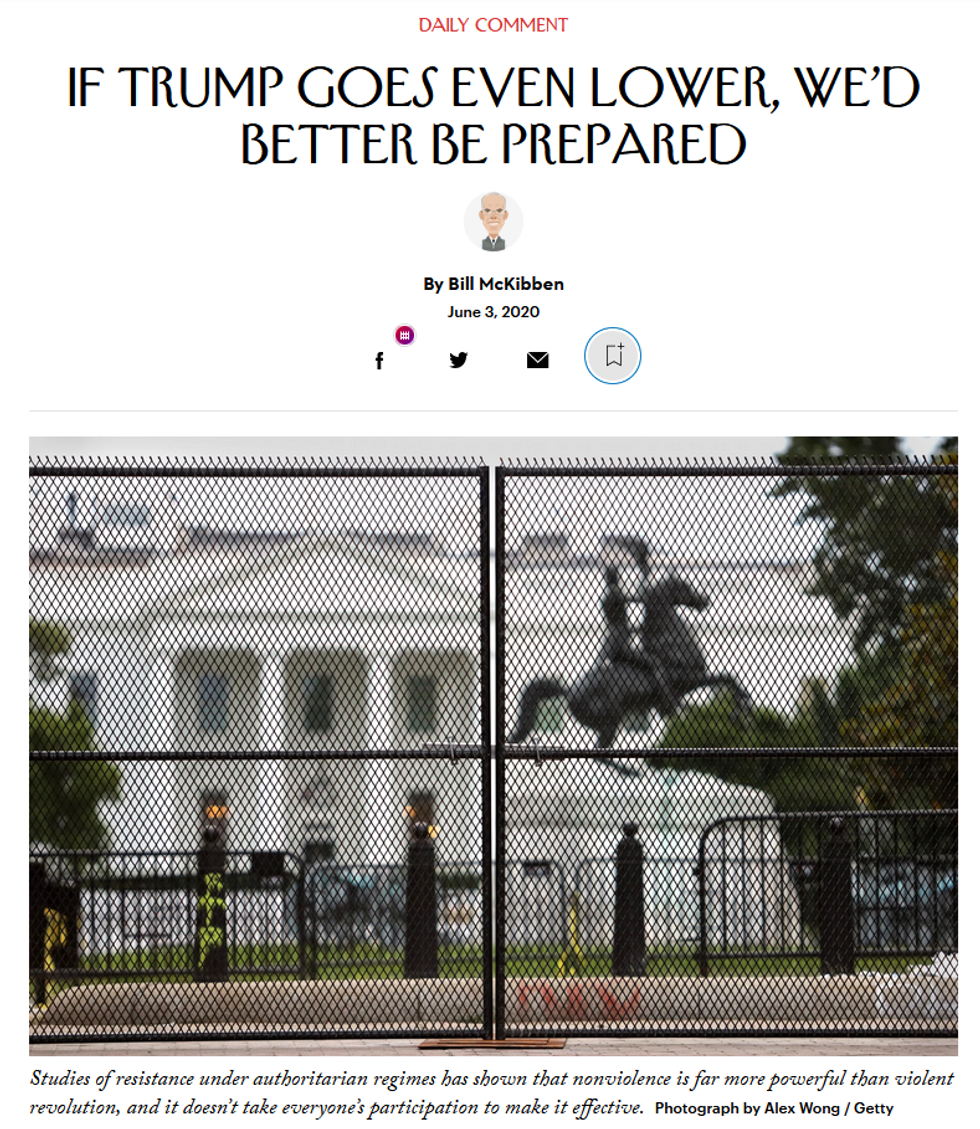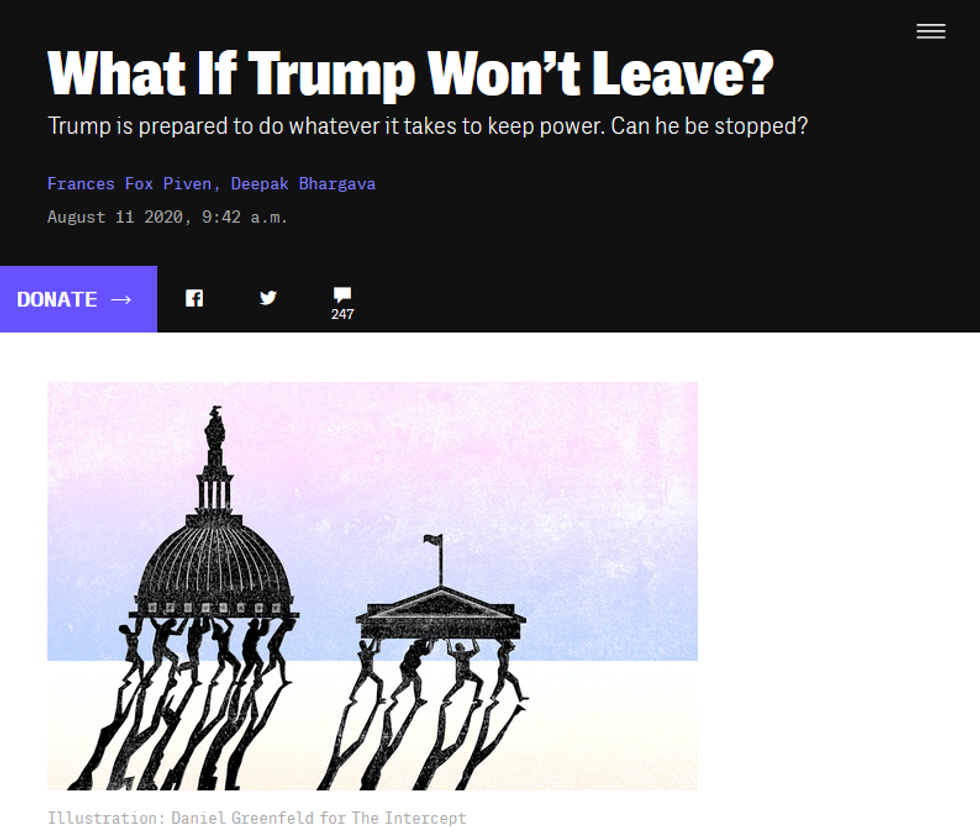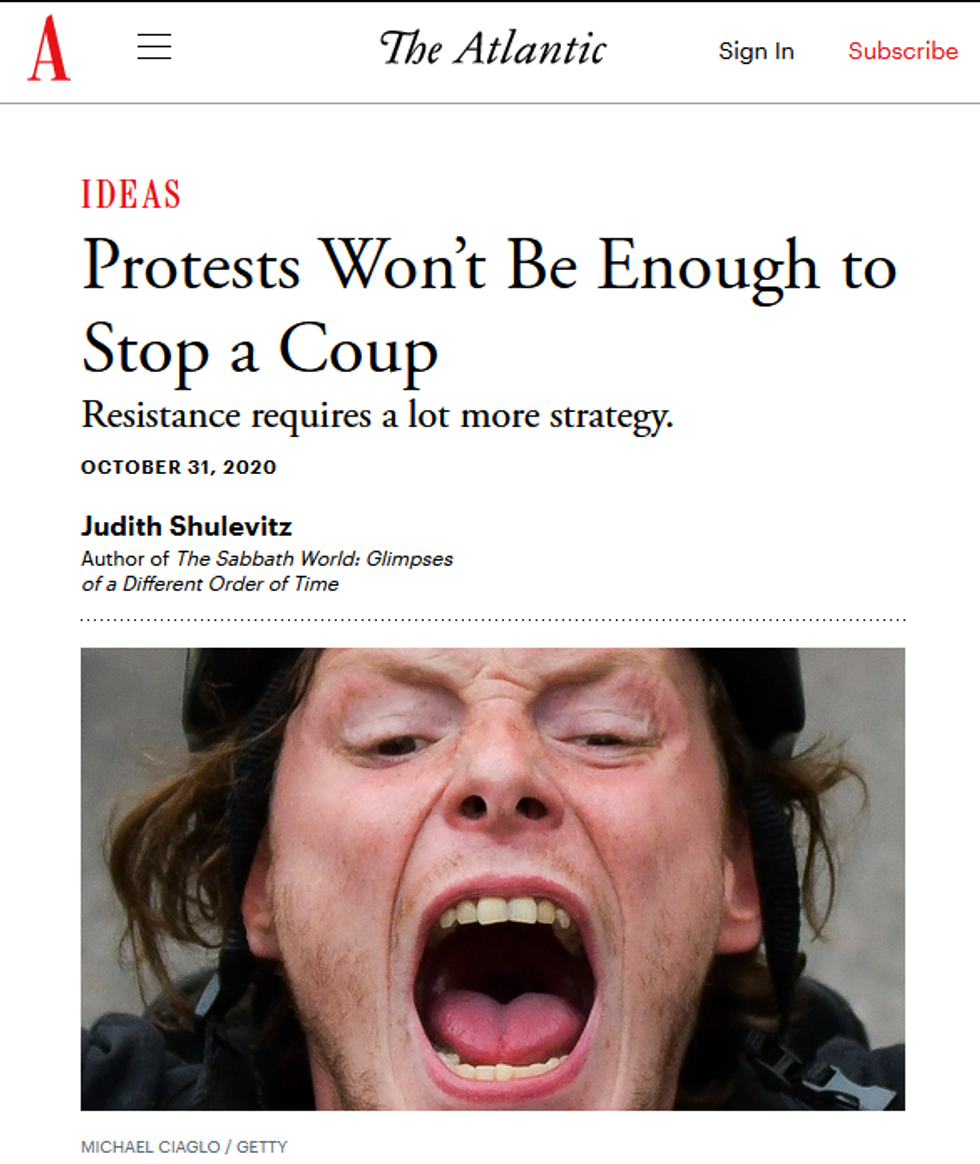On Sunday evening, two days before Election Day, Trump told reporters in Charlotte, North Carolina, "We're going to go in the night of, as soon as that election is over, we're going in with our lawyers." The Washington Post (11/2/20) reported Monday morning that the "president's comments are among his most unambiguous yet...." Here the paper could have followed with "...of Trump's ongoing efforts to steal the election." (See FAIR.org, 9/15/20.) But instead WaPo printed, "that he is embracing an aggressive legal strategy in an election that has already been beset with a multitude of lawsuits."
The piece follows with another Trump lament:
"I think it's terrible when we can't know the results of an election the night of an election in a modern-day age of computers," said Trump, before alleging that the Democratic governors of Pennsylvania and Nevada would somehow interfere with accurate counting.
The short article amounts to little more than a series of Trump statements, nonsensical, obfuscating and pernicious, left to stand without comment, background, context or challenge, unless "alleging" and "somehow" count as explanation. To make sure that readers have heard every word out of Trump's mouth, the paper positioned a video on top of the print story, featuring only Trump, who speaks on a landing strip against an evening sky in front of a microphone on a stand set up for the occasion. No graphic explanatory text or comments of any kind are seen.
The Post piece illustrates the way corporate media have covered Trump so much of the time, as what David Barsamian called "stenographers to power." That was the headline of a post John Nichols (The Nation, 11/23/04) wrote after the 2004 election, which quoted Britain's Daily Mirror marveling at election results that gave George W. Bush a second term: "How can 59,054,087 be so dumb?" Nichols' answer cited an ad for the Weekly Guardian: "Many US citizens think the world backed the war in Iraq. Maybe it's the papers they're reading."
In the weeks leading up to the election, Trump repeated his election night expectations (CBC, 10/29/20):
It would be very, very proper and very nice if a winner were declared on November 3, instead of counting ballots for two weeks, which is totally inappropriate, and I don't believe that's by our laws.
Writing in the journal Science (10/16/20), historian Jill Lepore traced the history of calling election results. In 1800, the presidential contest that pitted Thomas Jefferson against John Adams began in March and ended in November. The winner was declared only weeks before inauguration. Today, both voting and counting in the United States are much faster, "if not always more fair." Lepore warned, "This year, the communication of results long before they can possibly be known threatens to undermine not only the election but democracy itself."
The AP (10/31/20) ran an explainer that cited Lepore's opinion piece, but of the elite press, only the Washington Post (10/31/20) chose to re-publish the wire-service copy, and it failed to include the argument in subsequent news reporting on the election.
Instead, corporate media approached election night with circuitous, often tepid reporting, scattered with euphemisms that obscured GOP voter suppression efforts and the clear possibility that Trump will try to steal the election. On CNN's Reality Check (10/28/20), for example, John Avlon had three minutes to explain election night, and as he stood in front of a large map of the US, pointing to Pennsylvania, Michigan and Wisconsin, he said, as if talking to a third-grade Zoom class:
We've been telling you to expect election week, not election night. These three swing states will not start counting most early ballots until Election Day, which means that we won't know the final results [right away].
He tells viewers that Democratic votes may increase when mail-in ballots are counted, and goes on to employ a dandy new media phrase: "It's the so-called 'blue shift,' and it's legitimate, not fraudulent as the president says."
The "blue shift" is what the New York magazine (10/8/20) called "a thoroughly rotten premise that a 'blue shift' toward Joe Biden as mail ballots come in has to represent fraud and a 'Democratic coup.'" Trump's claims of a "Democratic coup" are part of media discourse now, but a Trump coup is not.
Avlon's final words are a mastery of vague phraseology joined together in a nonsensical mush:
But this is already the most litigious election ever. And there are reports of post office slowdowns. It's all a reminder that nothing is preordained. Keep cool. Remember the right to vote is really the fight to vote. And democracy is on the ballot. And that's your reality check.
We are left to ponder the precise moment when one person, one vote became the right to vote is the fight to vote.
For all its expressed concern, this word salad hides a deliberate GOP strategy designed to suppress the vote. Instead, CNN offers calm, patience and an acceptance of a new normal--a threatened electoral process that just is.
When Avlon says 2020 is the most "litigious election ever," he neglects to connect that litigation to the Trump campaign, which has hired a massive legal network with dozens of attorneys to bring legal challenges in key battleground states (Politico, 9/27/20). Most cases revolve around restricting time frames for mail-in ballots, and the length of time allowed to count them.

Even though media report such legal maneuvers, they rarely if ever use the words "voter suppression." Business Insider (9/27/20) reports "an all-out legal war to stop the expansion of vote by mail," detailing actions against New Jersey, Nevada, North Carolina, Iowa, Pennsylvania and Montana, states that have allowed voters to cast their ballot by mail more easily because of the pandemic. But after detailing the legal arguments, the article simply ends. No words explain what it means, why such legal maneuverings are being done, and what the consequences might be for the election-and democracy. Indeed, a FAIR study (9/15/20) searched eight large-circulation newspapers for the keywords "Trump," "election" and "steal," and found that from July 7 to September 7, "there wasn't a single article reporting that Trump is trying to steal the 2020 election."
Trump himself continues to boast about his successes at blocking the democratic process. At a press conference in Las Vegas between campaign stops, Trump said (Business Insider, 10/28/20), "Hopefully, the few states remaining that want to take a lot of time after November 3 to count ballots, that won't be allowed by the various courts."
In contrast to most news reporting, Seth Meyers (Late Night, 10/28/20), a comedy host, actually articulated an expository discourse, delivered in his clipped sardonic style, proclaiming:
The plan is clear. Trump and the GOP are doing everything they can to suppress and undermine mail-in voting, hoping they can prematurely declare victory on election night.
He also noted that nothing in the Constitution or federal law requires that all ballots be counted by 11:59 PM on November 3: "Election night is just a thing invented by radio and TV channels for ratings." It's a media creation.
Meyers connected the dots between GOP actions and rhetoric, and the Supreme Court decision in Bush v. Gore. He pulled quotes from Brett Kavanaugh's latest amateurish legalese, as the Supreme Court justice reached into the air for reasons to claim that counting ballots after Election Day would be suspicious: "States want to avoid the chaos and suspicion of impropriety that can ensue if thousands of absentee ballots flow in after election day and potentially flip the results of an election."
Meyers responded with incredulity: "What are you talking about? If there are more ballots to count, then that means that there are no results to flip!"
Alarmed by Kavanaugh's performance, an article headlined "He's Down to Steal This Thing" in Common Dreams (10/27/20) quoted the Atlantic's Adam Serwer, "Kavanaugh is announcing to the world that if it will help Trump win, he will join a decision to not count votes"
Slate (10/27/20) also sounded an alarm, worrying that Kavanaugh "has given the nation another legitimate reason to fear that this election may end with a Bush v. Gore-like disaster for American democracy, but even worse than the original." Legal correspondent Mark Joseph Stern pointed out that just minutes after the Supreme Court issued its ruling Monday night, Trump falsely tweeted that there are "big problems and discrepancies with mail-in ballots all over the USA."
But again, it was Meyers who used the most forceful and direct language:
It couldn't be any clearer that Trump and his allies on the Supreme Court are telegraphing their plan to orchestrate a sequel to Bush v. Gore, by hoping Trump is ahead on election night and then prematurely declaring him the winner before all the votes are counted.
Unfortunately, Meyers ended his piece with, "There is one way we can stand up to this and it's by voting in overwhelming numbers to repudiate Trump." This seems to imply that if Trump succeeds in stealing the election, we have only ourselves to blame, for not voting overwhelmingly in person and risking our lives in the process.
Indeed, organizations and activists have worked tirelessly to mobilize get-out-the-vote campaigns, and, by all measures, early voting by Democrats has been something like an insurrection. But increased violence and intimidation from Trump caravans roaming the streets nationally, legal shenanigans and court decisions have been so pervasive, especially in swing states, that Trump proudly boasted on election night that "we have already won," calling the election a fraud.
Legitimating Legal Strategies to Suppress the Vote
As Trump openly cited his legal efforts to stop mail-in ballots, media would add, "arguing without evidence that such plans would lead to widespread voter fraud." Indeed, no such evidence exists. But media have failed to draw out this lie. "Arguing without evidence" means he is lying. Habitual use of this now iconic phrase has lost any punch. Contextual journalism would explain that fraud claims are being used as a justification to suppress voting and vote-counting, in hopes of holding onto the White House despite losing the election.

Reporting has consistently failed to point out that Trump and Republicans, especially Trump's Attorney General William Barr, are validating open voter suppression with such claims. The New York Times Magazine (6/2/20), in a 9,000-word-plus profile celebrating Barr's long career (describing him as "rumpled," with a soft speaking voice), quotes his claim that "there are a number of foreign countries that could easily make counterfeit ballots, put names on them, send them in. And it'd be very hard to sort out what's happening." The words stand without counter or comment, or 2020 election consequences.
No mention is made of the ways these strategies are tied to the history of anti-democratic voting procedures. Details of court cases are not tied to Trump's threat that he will not leave the White House. No warning that these are the actions of an autocrat laying the groundwork for a coup.
At a press conference held on September 23, when asked if he would commit to a peaceful transferal of power after the election, Trump hedged:
Well, we're going to have to see what happens. You know that I've been complaining very strongly about the ballots and the ballots are a disaster--the ballots are out of control. You know it. And you know who knows it better than anybody else? The Democrats know it better than anybody else.
For months, Trump has been pounding that same message: Mail-in ballots are an evil Democratic scheme to rig the election, so he won't accept the results, and he won't leave. But that logic remains unspoken in most press accounts. And they dare not call it a coup.
Call It a Coup
Often-arrested climate activist Bill McKibben observed back in June that Trump seemed to be gearing up for "a coup" (New Yorker, 6/3/20). McKibben argued that Trump's "constant shout-outs to the Second Amendment people" was nothing less than a clarion call for violent disruption. As Trump trailed in the polls, the danger mounted. "It's hard to know what, precisely, a coup looks like if the leader is already the president," but McKibben offered a disturbing dystopian vision of state terrorism and a media blackout:
Try to imagine troops ordered to use live rounds rather than rubber bullets, no social media on which to talk about it, and Fox News as the only sanctioned TV channel.
He added, "Indeed, if you're black, facing live ammunition is already an outsize reality here."
If Trump tries to carry out such a coup, McKibben warns, "Americans would be in a difficult predicament: whether to submit to that rule or stand up to it." As one who fully understands the power of nonviolent civil disobedience, McKibben amassed an extensive list of tactics pulled from a mentor of his named Gene Sharp, who catalogued 198 "methods of nonviolent actions" that people have used to stand up to authority. He recommended that we all spend some time with the list. "It could come in handy--soon."
On October 28, five days before Election Day, The Nation presented Democrats with a three-point strategy of what they must do should Trump try to stage a coup. First, unlike what Al Gore did in 2000, "Joe Biden must not concede unless and until a complete and fair count of every ballot cast shows conclusively that he is the loser."
The second action calls on Democratic governors to appoint Biden electors if Republicans refuse to count every ballot before the Electoral College votes on December 14. They must also battle Republican state legislators should they try to appoint fraudulent Trump electors.
The third point calls for congressional Democrats to fight for democracy by every means available, from political, procedural and legal tools to exclude Trump's electors from states where he didn't win--or where Republicans attempt to prevent a full count.
Essentially, the writers call for Democrats to do what Republicans have done so successfully, and what Democrats have failed to do for years: fight an all-out political guerilla war. If necessary, Democrats must order "the sergeant at arms to remove Mike Pence and the Republicans from the House chambers in order to indefinitely delay the counting of Electoral College votes until Trump concedes."
Most importantly, Democrats must call on "protesters to physically shut down the Capitol with nonviolent civil disobedience in order to prevent fraudulent Electoral College votes from being counted."
Writing in the Progressive (10/26/20), Stephen Zunes, who has studied pro-democracy civil insurrections around the world, agreed with The Nation. He documented the ways successful popular insurrections have been able to reverse the tide of stolen elections by mobilizing large numbers of supporters within days. Other actions include large-scale noncooperation events that challenge the legitimacy of the incumbent government, including strikes, civil disobedience and the establishment of an alternative center of power.
If enough people are in the streets engaging in nonviolent actions, centrists, who have been robbed of victory, and civil society can be mobilized. This may lead to "loyalty shifts" among regime allies, including noncooperation, defections and desertions by government officials and security forces.
Establishment Media Will Urge Calm, Tell Us to Wait
Judging by the coverage and language to date, media will call for stability and defer to power. They will tell us to wait while they appeal to legal reasoning, offering long detailed accounts of court filings until time runs out.
Writing for the Intercept (8/11/20), Frances Fox Piven and Deepak Bhargava recognized these tactics as
the standard playbook of authoritarians everywhere: cast doubt on the election results by filing numerous lawsuits and launching coordinated federal and state investigations, including into foreign interference; call on militia groups to intimidate election officials and instigate violence; rely on fringe social media to generate untraceable rumors, and on Fox News to amplify these messages as fact; and create a climate of confusion and chaos.
Piven and Bhargava reported that the Biden campaign is recruiting lawyers, not organizers. They are consulting Democratic Party operatives, "good-government types," constitutional lawyers and other "experts," who will urge us not to "politicize" the process. The party will tell us to wait for the "rule of law," trust the process and the courts, and stay home and let the "smart boys in DC work things out on our behalf."
But as hard as it would be for Democrats to reverse years of shunning progressive activism, positioning themselves above the fray and putting their faith in political norms and legal strategies--even though they have failed--it is even harder to imagine establishment media bearing witness to an all-out fight for democracy. So accustomed are they to legitimating presidential power, it will be as uncharacteristic of them to change course as it will be for Democrats to take action.
Most likely, media will cover protests with a false-balance frame that pits democratic insurgents against white nationalist Trump supporters, treating them as equivalent. After all, Trump has given a green light to white nationalist groups, and the Republican Party deputized 50,000 "poll watchers" to intimidate minority voters on Election Day.
We see a glimpse of this in New York magazine (10/8/20), where Ed Kilgore disagreed with the election-theft scenario laid out by Barton Gellman in the November issue of the Atlantic. Kilgore characterized Gellman's writing as a crystallization of "progressive fears about what Trump might be cooking up." A Trump coup is seen as a left-wing fear, not a struggle between pro-democracy citizens and every effort by a demagogue to stage a coup.
We need only to look at corporate media coverage of the Black Lives Matter movement, that has vilified protestors as the primary instigators of violence and theft, rather than police and the structural racism they are protesting against. Media have gone so far as to preemptively blame BLM for Trump's reelection (FAIR.org, 11/03/20).
In addition, FAIR (10/30/20) reported that media covered protests of the latest police killing in Philadelphia in deliberately inflammatory language, and Forbes (10/28/20) repeated White House claims that the protests were "the most recent consequence of the liberal Democrats' war against the police."
Media would most likely delegitimize civil actions in other ways as well. In fact, the Atlantic (10/31/20), in an article illustrated with the large, unpleasant picture of a wide-open mouth, went so far as to say, "Protests Won't Be Enough to Stop a Coup." Why? Because "resistance requires a lot more strategy." This article is actually a rare, well-researched informative guide, cataloguing the writings and strategies of resistance. So where did the headline come from?
It draws attention to the fact that corporate media have been overwhelmingly silent on the hundreds of organized groups preparing to respond in the streets using nonviolent resistance. Democracy's defenders have prepared long documents detailing actions and strategies, such as this resource guide, completely missed by corporate media. But Common Dreams (10/27/20), among other alternative news sites, has reported on how "organizers across the country are planning at least 375 events at government buildings and other public spaces," and are urging supporters to visit the Protect the Results coalition's website.
Will the media continue to align themselves with a demagogue by failing to identify his refusal to leave as a "coup," or will they finally embrace the perspective demanded by their First Amendment mandate and, in the name of democracy, uphold freedom of expression should American citizens collectively take to the streets to defend our democracy?
As Piven and Bhargava understand, rational debate, rule-following and conflict avoidance "don't work against autocrats."
After cataloguing the overwhelming evidence to date of Trump's tactics to steal the election, in the early morning hours of November 4, the Washington Post's Dana Milbank acknowledged that Republicans were working furiously to stop votes from getting counted, "in hopes that this could turn another popular-vote defeat into another electoral-college victory."
Media may make it seem like a legitimate legal process, but it would be a Trump coup d'etat.

